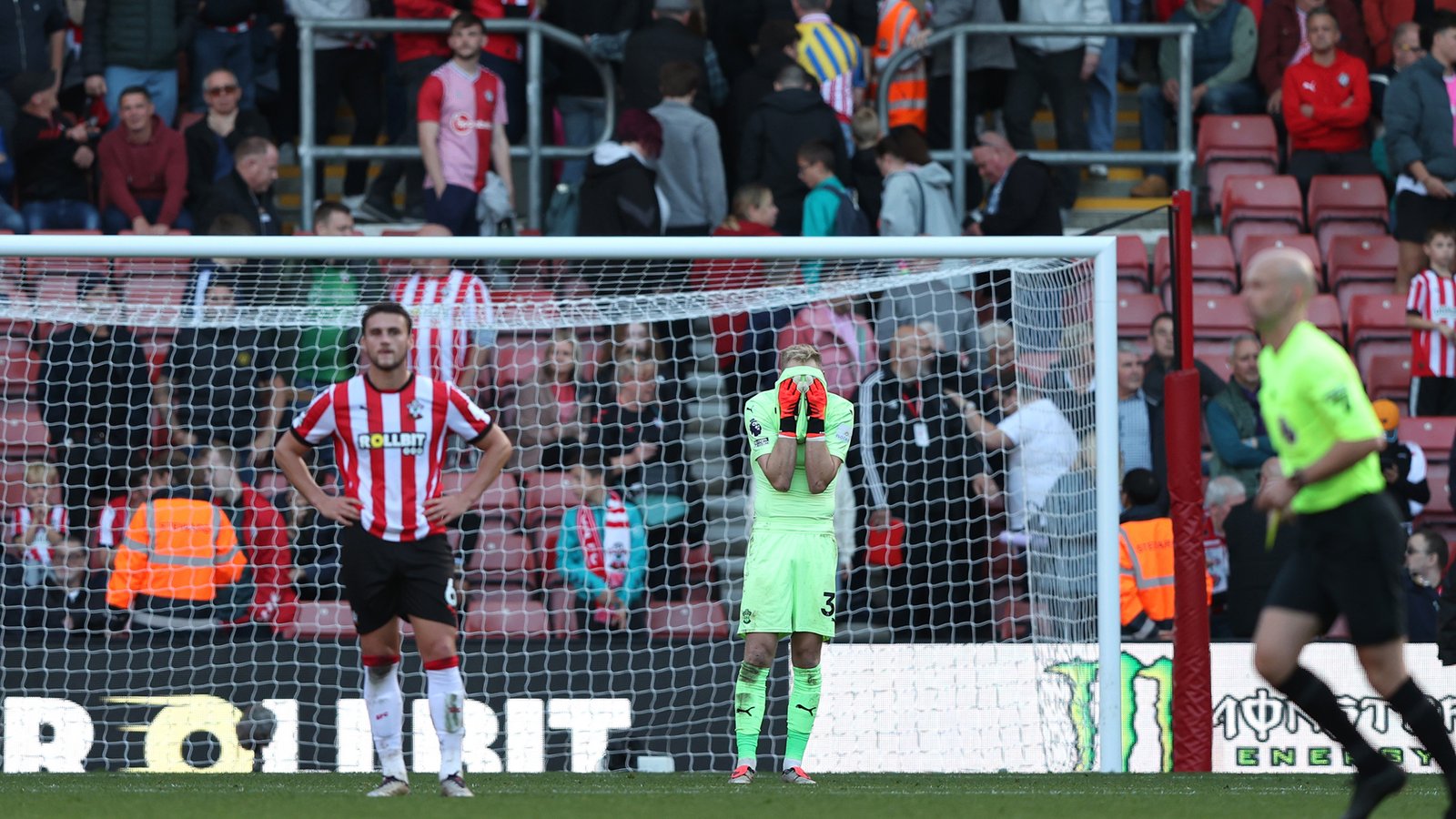
Promotion from the Championship into the Premier League is a double-edged sword. On the one hand, it is the greatest financial boost in world soccer, one that can change a club’s entire future. On the other, the clubs that make the trip into the top division often have to throw out everything that worked in the Championship in order to survive.
It’s not too bold to say that teams reliant on possession in their chase for promotion must quickly adapt to playing without the ball against the Liverpools and Arsenals of the world. This is a lesson that Southampton is learning ever so painfully at the start of this season, and whether the club takes it to heart or not will likely dictate whether the Saints go marching back to the Championship next season.
It all starts with manager Russell Martin. The 38-year-old Englishman is in his third top job in just over five years, and his meteoric rise through the ranks underlines his tactical acumen. Martin went from managing perennial villain MK Dons, where he finished his playing career, to stepping in at Swansea City in 2021. Two years later, ahead of last season, he moved up yet again, taking over at Southampton. At neither of the first two stops did Martin achieve promotion, which speaks to how well-respected his style was, even without tangible success.
That style is simple to describe, if difficult to put into action with anything below the highest tiers of players: Martin is a possession fanatic. His teams prioritize short passes, especially out of the back line, in hopes of slowly cutting down a defense. The plan is straightforward: lull a defense into a trance, get them out of position, then strike with incisive passes into the box. Southampton, even at its worst, is good at achieving passing superiority. For the season, only heavyweights Manchester City, Liverpool, and Tottenham have completed more passes than Southampton, and the Saints had won the possession battle in five of their first seven matches.
In theory, this is a good strategy, but Southampton doesn’t have quite the individual talent to translate its obsession with the ball into points, at least not at the Premier League level. This has become a problem, really the problem, for the team in its return to the Prem after a one-year stint in the second division.
Let’s take the most recent match as an example. Southampton came out on fire at home against fellow recently promoted side Leicester City. The first half was probably the apotheosis of Martin’s playing philosophy. The Saints peaked at almost 80 percent possession, blitzing the visiting Foxes up and down the field. The goals came with the run of play. In the 8th minute, Kyle Walker-Peters found a nice run by Ryan Manning, and the Irishman slotted a low cross into the box, where Cameron Archer found it with just enough space after a light deflection to score the opener.
Twenty minutes later, Walker-Peters was it again, dribbling by James Justin before slotting yet another low cross. This time, Archer let it go by him, and Joe Aribo replicated his teammate’s finish with a tidy shot into what was mostly an open goal:
That Southampton scored two goals in the opening 28 minutes wasn’t surprising, given how the game started. What was surprising was that there weren’t more goals, but that has been the story of the season so far. Entering Saturday’s match, only Manchester United (with its well-documented problems) had under-performed its expected goals by more than Southampton, and Southampton now sits in dead last in that specific metric following the Leicester match.
Still, though, two goals against a fellow relegation candidate, in the fashion that Southampton scored them, should have been enough. The problem with a style like Martin’s though is what happens when it gets flipped on his team. From the 41st minute on, Leicester had more of the ball than Southampton, and comically so. Though possession stat ended 55-45 in Leicester’s favor, it was 62-38 in the second half. Essentially, Leicester asserted its superior talent—despite both being newly promoted teams, there is little doubt Leicester’s roster is a bit better suited for the top flight—and flipped the script on Southampton, exposing the Saints’ weaknesses in defense without the ball.
The first Leicester goal was classic possession: Starting in its own half, Leicester made 15 passes on the way into the box, and Abdul Fatawu ended the move with a nifty cut-back that was slotted in by 19-year-old Argentine Facundo Buonanotte in almost a mirror image of both Southampton goals.
The tide had begun to shift, and Southampton didn’t really have a way to resist it. That was doubly true after the 73rd minute, when a scramble in the box following a Fatawu header from point-blank range saw Saints winger Ryan Fraser forced into a cheeky shirt tug on Jamie Vardy to prevent an easy tap-in for the equalizer. Unfortunately for Fraser, it is the age of VAR, and the replay showed pretty clearly that he had stopped a clear scoring opportunity. Not only did Leicester get a penalty, but Fraser was sent off, and though the score was still tied after Vardy’s subsequent penalty, it looked over.
And yet, it took until the death of the game for Leicester to finish the job. Despite being up a man for about half an hour, Leicester struggled to find a winner, but Southampton’s defense was bound to crack under Leicester’s pressure eventually. It was a corner that spelled the inevitable doom for the hosts, as a 98th-minute bouncer of a cross from Harry Winks found both Fatawu and Jordan Ayew wide open in the box. Ayew got to it first, firing off a rugburner that somehow avoided the mass of bodies in front of goal and went in past Aaron Ramsdale.
This is the type of game a freshly promoted side has to win, but Southampton came out on the losing end due, in large part, to Martin’s commitment to playing his style. Were Southampton better prepared to play without the ball, perhaps it wouldn’t have given up so many second-half chances, or maybe it could’ve counter-attacked during Leicester’s period of ascendancy to put the game out of reach. Instead, Southampton looked lost in the second half, thirsty for the ball but with no real plan on how to counter Leicester’s own insistence on possession.
If Southampton is to stay up, Martin will have to do something he hasn’t done in his managerial career to date: change. From the days when his MK Dons side had the third-highest possession rate in Europe, behind only the famously ball-hungry sides of Manchester City and Barcelona, he has drilled his teams to play one way. That way has mostly worked, insofar as it has helped Martin climb the English soccer pyramid, but the team results simply aren’t there when facing tough opposition. Even last season, Southampton was in line for automatic promotion before faltering towards the end, and had to win the grueling Championship playoff to come back up to the Premier League.
And so, though Martin will surely see his side’s possession supremacy in what is now five of eight matches so far (only Arsenal, Manchester United, and Leicester on Saturday have out-possessed the Saints) as a success, there’s no sugar-coating the fact that the club is mired in 19th place, only ahead of Wolverhampton on goal difference. One point in eight matches, with only six goals scored (second-worst in the league), is the kind of start that gets a manager fired in favor of a caretaker who will prioritize pragmatic tactics in order to ensure survival. Martin is not that type of manager, but he might have to be, or his steady rise will finally crash back down to earth, along with Southampton’s hopes of staying up this season.








